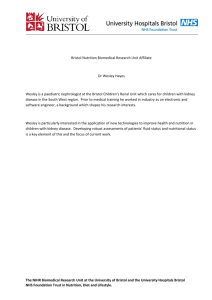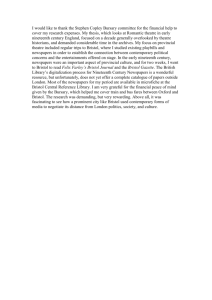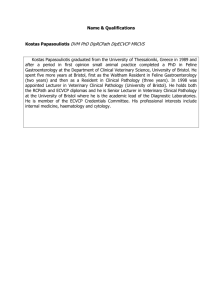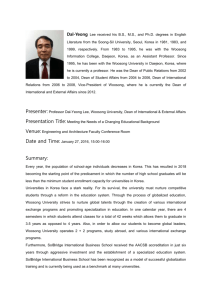The Society for Research into Higher Education South West Higher
advertisement
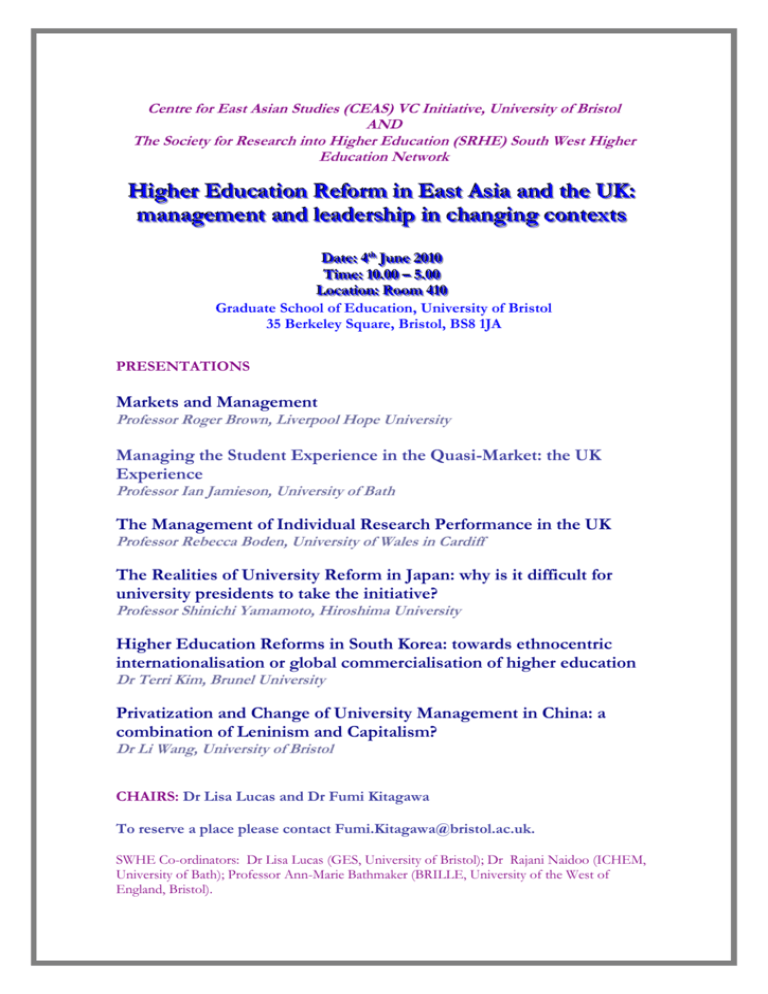
Centre for East Asian Studies (CEAS) VC Initiative, University of Bristol AND The Society for Research into Higher Education (SRHE) South West Higher Education Network H Hiigghheerr E Edduuccaattiioonn R Reeffoorrm m iinn E Eaasstt A Assiiaa aanndd tthhee U UK K:: m maannaaggeem meenntt aanndd lleeaaddeerrsshhiipp iinn cchhaannggiinngg ccoonntteexxttss th D Daattee:: 44tthh JJuunnee 22001100 T Tiim mee:: 1100..0000 –– 55..0000 LLooccaattiioonn:: R Roooom m 441100 Graduate School of Education, University of Bristol 35 Berkeley Square, Bristol, BS8 1JA PRESENTATIONS Markets and Management Professor Roger Brown, Liverpool Hope University Managing the Student Experience in the Quasi-Market: the UK Experience Professor Ian Jamieson, University of Bath The Management of Individual Research Performance in the UK Professor Rebecca Boden, University of Wales in Cardiff The Realities of University Reform in Japan: why is it difficult for university presidents to take the initiative? Professor Shinichi Yamamoto, Hiroshima University Higher Education Reforms in South Korea: towards ethnocentric internationalisation or global commercialisation of higher education Dr Terri Kim, Brunel University Privatization and Change of University Management in China: a combination of Leninism and Capitalism? Dr Li Wang, University of Bristol CHAIRS: Dr Lisa Lucas and Dr Fumi Kitagawa To reserve a place please contact Fumi.Kitagawa@bristol.ac.uk. SWHE Co-ordinators: Dr Lisa Lucas (GES, University of Bristol); Dr Rajani Naidoo (ICHEM, University of Bath); Professor Ann-Marie Bathmaker (BRILLE, University of the West of England, Bristol). ABSTRACTS Professor Roger Brown, Liverpool Hope University Markets and Management It seems clear that the marketisation of higher education is reinforcing the internal differentiation of universities that is already occurring as a result of changes in the structure of knowledge. This differentiation is comprehensive, covering purposes, activities, structures, norms and personnel. This presentation will enumerate these pressures and consider how institutional managers should respond to them. I shall argue that in spite of all the pressures, a collegial approach is still the correct one, but, paradoxically, we may need enhanced regulation to bring it about. Professor Ian Jamieson, University of Bath Managing the Student Experience in the Quasi Market: The UK Experience The quality of the student experience is firmly on the agenda of UK higher education. This is the result of a confluence of factors underpinned by the growing marketisation of the sector. Government, Universities and students are responding in different ways, some of them with positive consequences for the student experience, some of them negative. The role of University management and leadership is fundamental. The resulting heterogeneity means that it is probably no longer possible to talk of the UK higher education experience. Professor Rebecca Boden, University of Wales in Cardiff The Management of Individual Research Performance in the UK Research knowledge has traditionally been advanced within and through epistemic peer communities in which peer review plays a central role. In the context of a more marketised and commoditised higher education system, the UK has experienced the deployment of new managerialist technologies aimed at purposively shaping and directing the research activities of academics. This has brought traditional professional academic judgement as to what constitutes ‘quality’ in research into conflict with neoliberal policy and management regimes of control. Research quality evaluation exercises, such as the RAE, have hitherto relied upon peer review. These are now coming under pressure from more managerial indicator-based evaluation tools such as citation indices and systems for ‘ranking’ journals. These purport to manage the direction and (subjectively determined) quality of research towards ‘desired’ neoliberally-determined norms. This work explores how and why indictor-based evaluation systems are being developed and becoming embedded, exploring both organisational trends and also the manner in which individuals (i.e. those whose performance is being measured and managed) imbricate themselves. Such transformations, it will be argued have profound implications for the nature of knowledge. Professor Shinichi Yamamoto, Hiroshima University The Realities of University Reform in Japan: why is it difficult for university presidents to take the initiatives? Since the beginning of 1990s, Japanese universities have been involved in a storm of reform and various kinds of measures have been taken by the government to make universities become more active, useful and accountable. It is the government and students who have taken initiatives but not university presidents and professors. Before 1990s the formers had no big voice for reform because of strong university autonomy and also because of little interest of people in the outcomes of university education. However, due to the progress of globalization and knowledgebased society, the role of universities has been changing toward more intensive relationship with economy and society. In addition, political situation changed in early 1990s and the government has succeeded to get a grip for university reform. University presidents did not positively respond to the new situations, rather they have been forced to passively accept the new framework such as national university corporation, national university accreditation, competitive mode of funding, and so on. In my presentation, I will deal with my several findings that may be helpful for deeper understanding of the new relationship among universities, government and the general public. Dr Terri Kim, Brunel University Higher Education Reforms in South Korea – towards ethnocentric internationalisation or global commercialisation of higher education? This paper examines higher education reforms in South Korea over the last two decades. It attempts to articulate a long-standing characteristics of Korean higher education development. The role of government in the development of higher education in Korea has been typically as a direct regulator rather than a coordinator. However, the global trend towards neo-liberal market principles and internationalisation began to be influential in Korea during the 1990s, which eventually led to a shift in higher education policies. The article critically reviews the current government’s political rationale for restructuring higher education against the backdrop of ‘globalisation’. It will be argued that despite such influences, the Ministry of Education (MOE) has not shifted its approach to higher education. The fundamental relations of the MOE and the higher education sector have not changed (Kim, 2008) and in consequence, the directions of higher education reforms in South Korea are at a crossroads of ethnocentric internationalisation and global commercialisation of higher education. Dr Li Wang, University of Bristol Privatization and Change of University Management in China: A Combination of Leninism and Capitalism? The primary aim of the paper is to examine the change of university autonomy as a result of the adoption of privatization practices in the higher education sector in China. Data for this article came from fieldwork conducted in China, including a small scale survey and in-depth interviews, in 2008. The article consists of three major parts. An overview of freedom of the higher education system in China was presented in the first section, analyzed from the perspectives of both providers (i.e. universities) and consumers (i.e. students and parents). It then probes into institutional autonomy in relation to regulative rules and correspondents’ opinions. The unique state-party controlling mechanism is also examined to reveal how institutional structure facilitates and/or limits university management. This is followed by a discussion on shifting university identify and its influence on university control. It concludes by arguing that the co-existence of the dual controlling mechanism and the neo-liberal practices indicates an innovative scope of state capacity on higher education governance. PRESENTER BIOGRAPHIES Professor Roger Brown is Co-Director of the Centre for Research and Development in Higher Education at Liverpool Hope University. He was previously Vice Chancellor of Southampton Solent University, Chief Executive of the Higher Education Quality Council, Chief Executive of the Committee of Directors of Polytechnics, and Secretary of the Polytechnics and Colleges Funding Council. He was previously a senior civil servant and local government officer. He has served on many national committees and boards. He has written a book Quality Assurance in Higher Education: The UK Experience since 1992 (2004) and many articles and lectures on different aspects of HE policy. His second book Higher Education and the Market will be published in summer 2010. He is currently a Visiting Professor or equivalent at London Metropolitan University, Edinburgh Napier University, Thames Valley University and the Open University. He is the Chair of Barton Peveril Sixth Form College, Eastleigh and a Board member of the Southampton Education Trust. He was elected a Vice President of the Society for Research in Higher Education in 2007. Professor Ian Jamieson was Pro-Vice-Chancellor for learning and teaching and the student experience for over 10 years at the University of Bath, UK. He is now a visiting Professor in the School of Management, University of Bath. He founded and edited the Journal of Education and Work. He has been an auditor for the Quality Assurance Agency for England and Wales and has carried out numerous university audits both in the UK and overseas. He sat on the HEFCE body, which oversees quality assurance and the student experience in England and Wales for three years. He has published five books and some 90 journal papers. Professor Rebecca Boden is Professor of Critical Management at UWIC. Working within the critical tradition, she addresses the role of management generally and accounting/finance in particular in sites of knowledge creation, such as laboratories and universities. Over the past ten years she has undertaken an extensive critique of the effects of neo-liberal ideology on higher education globally. She works across disciplinary fields with fellow scholars in sociology, education and science and technology studies in this work, as well as with a collective of colleagues at UWIC as HERC:ULES (Higher Education Research Centre: Universities, Learning, Economy and Society). Particular collaborations have been/are with Dr Maria Nedeva (University of Manchester, on publicly-funded science and on employability), Professor Debbie Epstein (Cardiff University, on managerialism and creativity in HE), Professors Debbie Epstein and Joanna Latimer (Cardiff University, on research ethics), and Professor Susan Wright (DPU, Copenhagen on Danish HE reform). She is the co-editor, with Debbie Epstein, Rosemary Deem, Fazal Rizvi and Susan Wright of the World Yearbook of Education 2008: Geographies of Knowledge, Geometries of Power – Framing the future of Higher Education. She is currently working with Dr Maria Nedeva and Dr Yanuar Nugroho (University of Manchester) on research performance evaluation. Professor Shinichi Yamamoto is Director of the Research Institute for Higher Education, Hiroshima University in Japan. His main concern is the analysis of various functions of higher education system, including university research, administration and management. After graduation from the University of Tokyo in 1972, he served for the Ministry of Education (Monbusho) for 17 years, where he got administrative experiences in school education, university and research management, and international affairs. He stayed at National Science Foundation of the United States as a research fellow in 1988-89. He was involved in OECD's activities, including research training, university funding, at CSTP (Committee on Science and Technology Policy) in 1992-2003. He was a member of the Overall Review Committee for Program II and Program III of UNESCO in 2006-2007. He has been serving for Hiroshima University since his move from the University of Tsukuba in 2006. He was the President of Japan Association for Higher Education Research in 2007–2009. Dr Terri Kim is a specialist in Comparative Higher Education and currently works as a full-time lecturer at Brunel University in West London and Associate in the Centre for Higher Education Research and Information (CHERI), The Open University and in the Centre for Higher Education Studies (CHES), Institute of Education, University of London. She gained her PhD at the University of London, Institute of Education in 1998, and previously worked as a research consultant for OECD; a Visiting Research Scholar in International Relations at LSE in London; a Brain Korea 21 Contract Professor at Seoul National University in Korea; and a Visiting Scholar at the Collège de France in Paris. She has published one book and over 30 articles internationally in the field of higher education, and her continuing work includes Higher Education policy, governance, management, transnational academic mobility, knowledge and identity capital, interculturality and cosmopolitanism, across Europe and Asia. Dr Li Wang has recently received her PhD from University of Bristol and obtained her bachelor in public management from Qingdao University, China. She currently works at the Centre for East Asian Studies (CEAS). Her main research interests are social exclusion and privatization related to education policies and reforms in China. She has published several journal articles and conference papers on education inequality in China.



